What is CRM?
Customer relationship management (CRM) tools are handy solutions for companies looking to cultivate, promote, and manage customer relationships efficiently. CRM systems allow you to centralize all consumer information, delivering context to all your customer-facing teams and counting layers of personalization to every customer interaction.
What does CRM software do?
CRM software is employed to facilitate and automate your whole customer-facing process. From lead accession to nurturing and transformation to post-purchase service, CRM systems allow you to manage every aspect of your customer-facing operations from a central hub, eradicating data silos and barriers for your teams.
Essentials
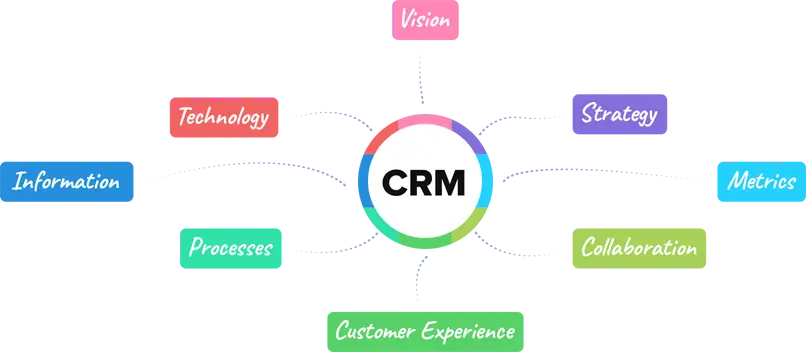
What are the types of CRM systems?
On-premises CRM vs. cloud-based CRM
One of the first options a company has to make is deciding between an On-premises and a cloud CRM system. An On-premises CRM system generally involves the company setting up the entire back-end infrastructure and footing the bill for maintenance and upgrade on top of the licensing cost for the existing software.
A cloud CRM system is often the favored option for companies as it is accessible smoothly through any browser, allowing more rapid deployments and usage. Other added benefits include:
- No maintenance or upkeep costs.
- Greater accessibility to your data when needed.
- The flexibility to scale up or down with ease.
Industry-specific CRM software
Numerous agents in the market offer CRM software, mainly built from the ground up, to cater to the niche needs of various industries. Dedicated CRM software is available for enterprise verticals like real estate, healthcare, insurance, financial services, media agencies, hospitality, and more.
All-in-one CRM solutions
The most popular cloud CRM offerings tend to be these all-in-one CRM solutions that are strong, incredibly customizable, and integrate with a broad range of prevalent business software to deliver a 360-degree view of your clients.
Because they are feature-rich, safe, and comfortable to use, allowing companies of different sizes and across various industries to leverage effectively and witness an immediate positive effect on their sales operations.
What does a CRM system do?
Whether you’re a small firm searching for a place to store information and have it available across numerous devices. Or a large company desiring to manage client interactions and focus on enhancing customer satisfaction. Because eventually, you will need a CRM system if your existing process cannot translate these pressing problems. Watch out for these hands on a cloud-based CRM:
Getting answers to the most fundamental questions
Ask yourself if you can acquire quick answers to the most fundamental questions like these – What’s my number of consumers, and how many did we win/lose in the last quarter? What was my income last month? Who shut the most deals?
Checking the entry of incorrect data
Poor decisions come from inadequate data. Failure to review the accuracy of data entering your system is a primary reason for concern. Because once you have a confirmation scheme with automated data entry, the inflow of inaccurate information can be controlled before it generates any trouble.
Connecting with customers and prospects
Customers can come from websites, social media, phone calls, etc. And a multi-channel communication system can get them closer to your business and allow you to cover all customer touch-points appropriate to your selling process.
Personalizing marketing efforts
Your marketing exertions can drain if your techniques do not draw prospects to try your service. Tasks like sending out promotions, newsletters, etc., can be personalized to provide that it combines with every customer on a personal level.
Bringing teams together
When each team is an island of its own, it becomes a massive bottleneck for any organization to grow. Because a real-time customer detail cannot be transmitted across teams concerning how you serve your customer needs.
How is CRM useful for a company?
Customer relationship management systems can be efficiently customized to satisfy the specific needs of any business type and size. Start-ups, large enterprises, and verticals utilize customer relationship management software to improve their sales, marketing, and customer support actions.
B2B
From driving an account’s contact details to staying up to date with industry deals, payments, and reports, B2B businesses do nicely with a sales CRM in place. Because it allows them to create a shared platform to keep their partners, vendors, and other business stakeholders in sync.
B2C
B2C businesses have more straightforward customer life cycles and usually require a more direct and less time-consuming solution. A multi-channel CRM tool with features like lead management, sharing out instant surveys, marketing automation, etc., enables B2Cs to reach out to their customers more efficiently.
SMBs
SMBs aren’t small and medium enterprises but intelligent and modern enterprises. There’s no reality to the common misapprehension that cloud CRM is too pricey and complex for SMBs. They can consistently start their CRM journey with a free CRM system.
By being a significant technological leveler, small enterprise CRM systems provide SMBs with a level playing field and the power to compete against the more prominent players in their industry.
Enterprises
With state-of-the-art CRM features like workflow management, advanced analytics, territory management, and sales and marketing automation, enterprise CRM systems can reduce salespeople spend on mundane tasks. And offering more time to focus on their customers and unify their operations across multiple geographic locations.
Who can use a CRM system?
CRM systems have grown from simple contact management solutions to a constantly evolving technical marvel that handles a wide range of needs for companies and their customer-facing interactions. Because the breadth, depth, flexibility, and capabilities a CRM system can present make it an ideal tool for optimizing users’ day-to-day activities across your marketing, sales, and support roles.
For your marketers
Accelerate your lead-to-deal cycle by leveraging built-in marketing tools to conduct targeted and personalized campaigns. Also, foster and keep prospects entertained until you can pass these qualified leads on to your sales team.
For your sales team
Manage complicated sales processes smoothly, optimizing them through effective automation, AI predictions, and recommendations.
For your service agents
Facilitate ticket assignment and resolution, handle escalations, and raise customer satisfaction, retention, and lifetime value via a single platform.
What are the key features of a CRM?
Lead management
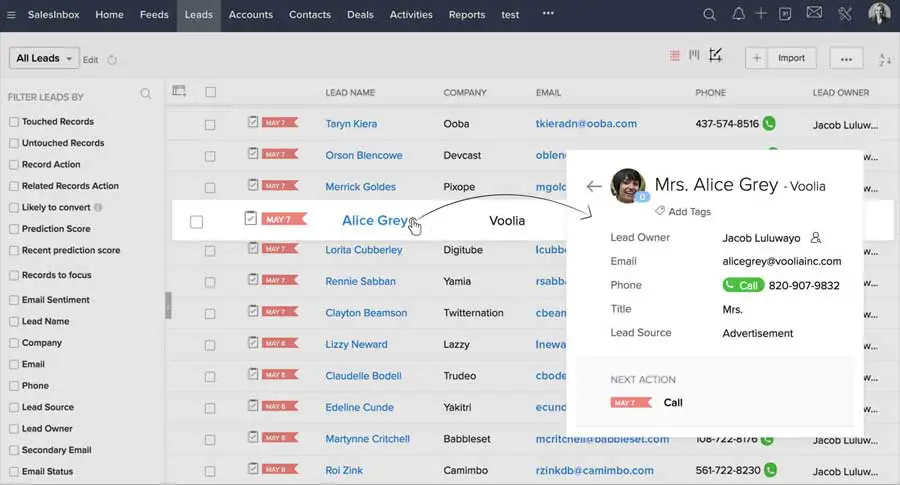
If bringing quality leads is one thing, following and managing them to deal with closure is another. CRM gives you everything you need to know about your leads to transform them into happy, paying customers. Because with lead scoring and automated lead assignment, you can allocate leads based on various parameters and know which leads have the most increased chance of moving down the pipeline.
Contact management
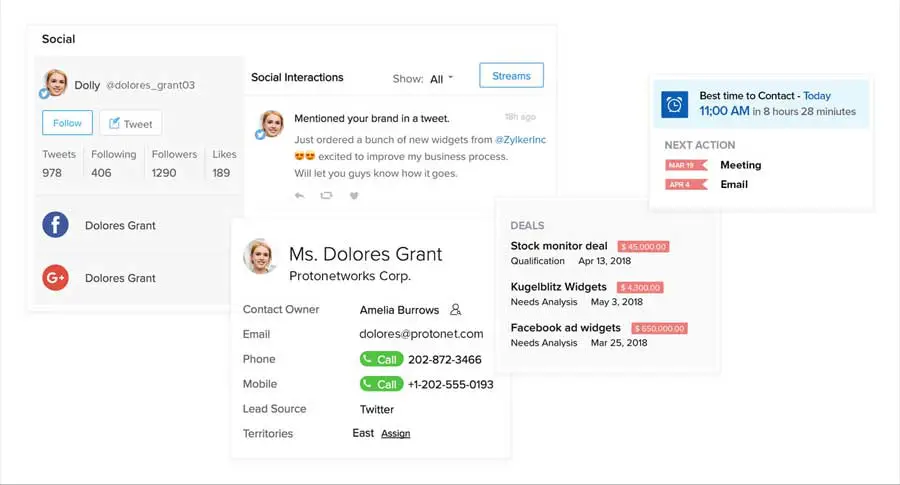
Contact management features in CRM enable you to organize your industry contacts in one place. You’ll know when and why you reached a customer the last time, the best time to contact them, mentions from social media interactions, and analytics to contact customers via email and other mediums of communication.
Deal management
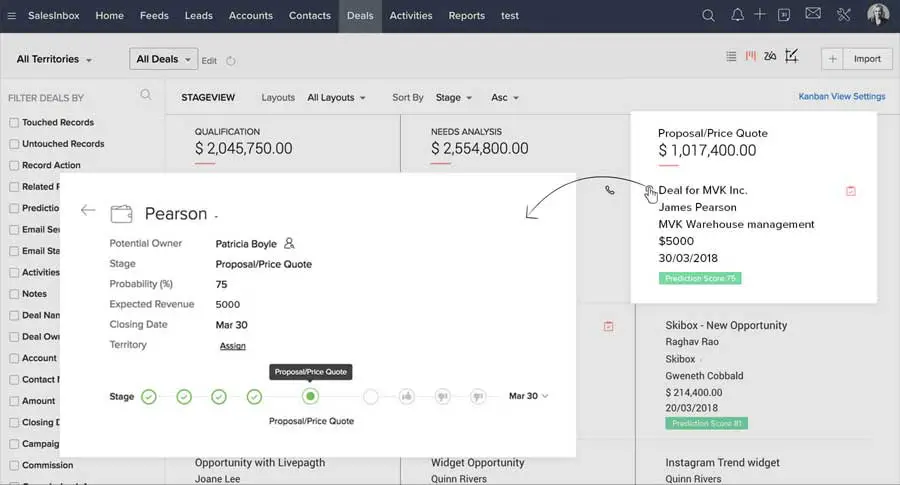
A deal, once lost, is lost forever. The deal management features in CRM offer you a complete picture of your current and future deals. And allows you to know what went wrong with your past unsuccessful ones. CRM lets you segment deals based on their present stage in the pipeline and can advise you on the probability of winning any deal.
Email management
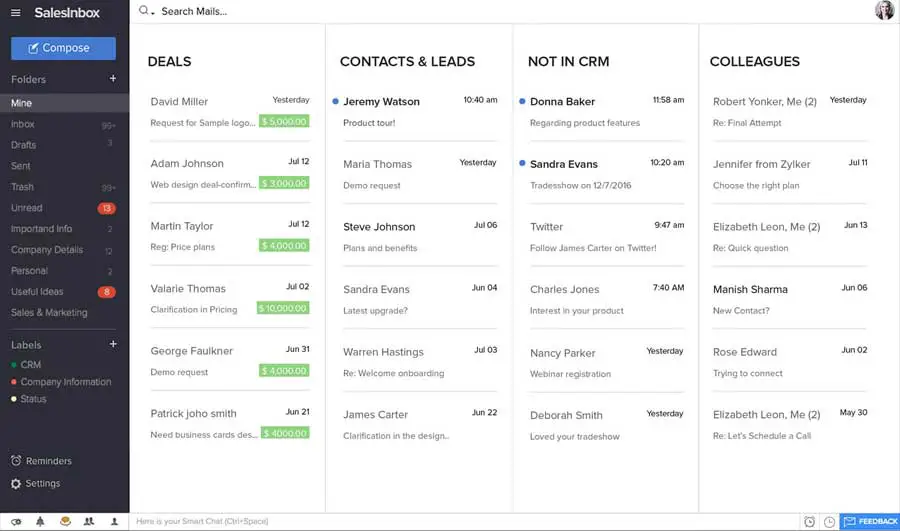
Email management is essential; an online CRM lets you control it completely. And any email client you utilize can be integrated with your customer relationship management tool. That means you preserve time switching between tabs to get work done.
Because the email management system inside a CRM allows you to prioritize emails, analyze the comeback to every email, and ensure you have comprehensive follow-ups with your receivers.
Sales Automation
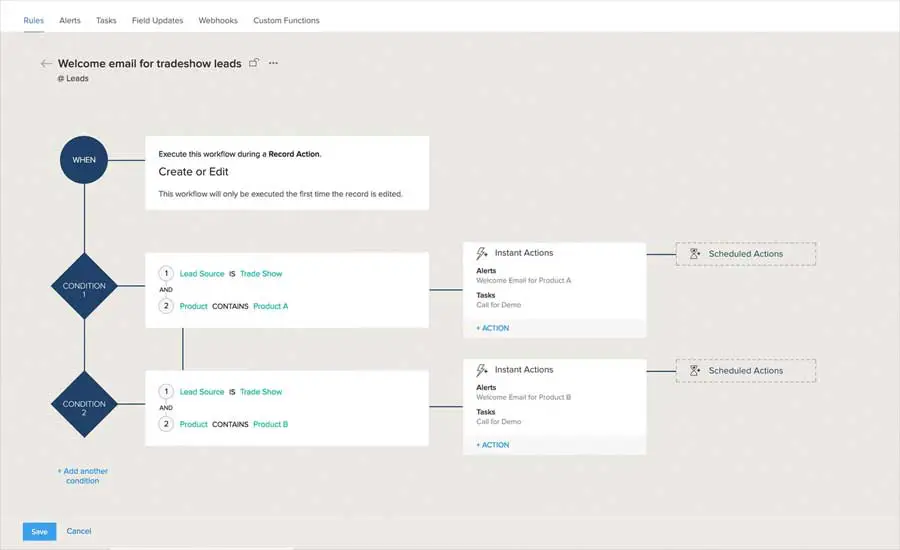
As a CRM implementor for your company, you like your sales team to pay more time selling and less time doing other organizational work. Here’s where automating your sales process will assist.
Because sales automation will enable you to replace mundane tasks with intelligent workflows and macros. Leads will flow via your pipeline more efficiently with the automatic assignment of leads to the right sales reps.
Reporting and analytics
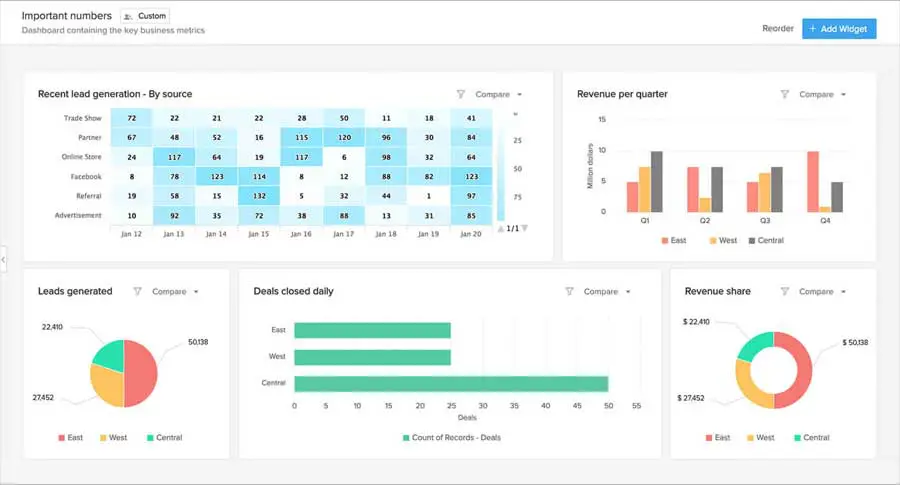
Analytics-driven industry culture can go a long way in transforming your organization’s decision-making style from “gut feeling” to “data-driven.” Because CRM system gives businesses the required intelligence to process data from different sources. And churn out practical insights to guide them with data.
From primary charts to state-of-the-art analytics insights, such as spotting anomalies in your company. An inbuilt analytics engine inside CRM can enable businesses to gain a critical competitive advantage.
Marketing automation
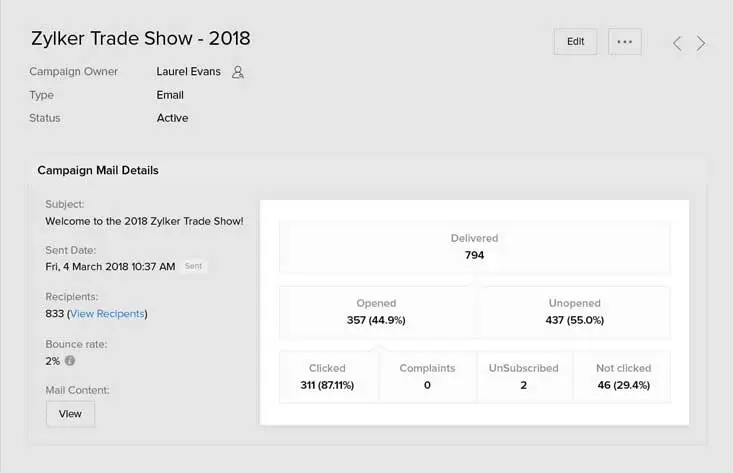
Often, businesses find themselves smashing their marketing budget due to inadequate planning and the failure to recognize their brand’s target audience. Because a disconnect between sales and marketing teams can hinder these efforts. With a Marketing CRM, you can develop new leads, manage targeted email marketing campaigns, and compare ad consumption to sales revenue. So eventually, get the maximum ROI on your marketing spend.
Customization
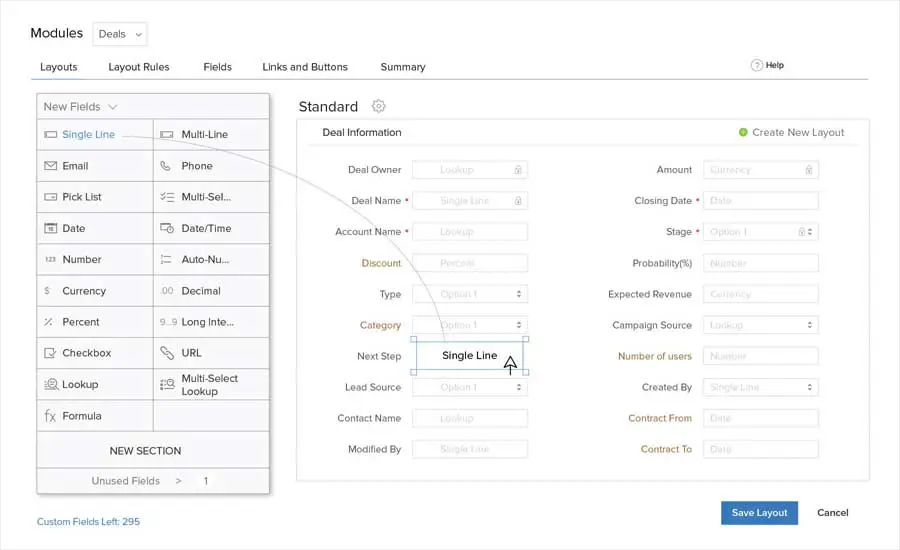
There is never a one-size-fits-all approach to executing a CRM platform for your business. Because any enterprise software solution on the market that can be customized to how your business works must be a CRM system. And you can customize your CRM with business functions, buttons, modules, fields, and layouts. Or even create a CRM entirely from scratch with offerings exceptional to your business vertical.






